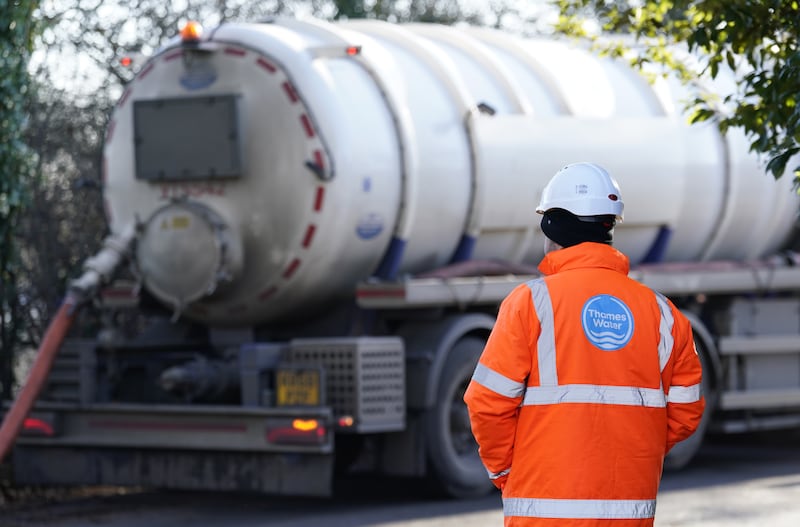New Environment Secretary Steve Reed will set out reforms aimed at stopping the “unacceptable destruction of our waterways” as he meets all the water companies in England and Wales.
Mr Reed will meet with executives at a crunch point for embattled water firms, which are under fire over sewage pollution and leaks, their demands to be able to put up bills for investment in ageing infrastructure and the bonuses and dividends they have been paying out.
Among the reforms the new Environment Secretary is set to announce on Thursday are ensuring water infrastructure funding is ringfenced and can only been spent on upgrades, as well a a change of company rules to ensure customers are at the heart of the companies’ objectives, and that consumers have the power to summon bosses to meetings.
Mr Reed will meet the companies as Ofwat releases its draft decision on the water industry’s future spending plans, setting out how far England’s suppliers can raise consumer bills over the next five years and how much they can spend on updating their ageing infrastructure.
Labour is casting its electoral win as a “reset moment” for the water industry according to a source close to Mr Reed, and it has promised to set out further plans to reform the sector in the coming weeks and months.
The Environment Secretary has meanwhile promised to “never look the other way while water companies pump sewage into our rivers, lakes and seas”.
Mr Reed added: “This unacceptable destruction of our waterways should never have been allowed, but change has now begun so it can never happen again.
“Today I have announced significant steps to clean up the water industry to cut sewage pollution, protect customers and attract investment to upgrade its crumbling infrastructure.
“That change will take time. Over the coming weeks and months, this Government will outline further steps to reform the water sector and restore our rivers, lakes and seas to good health.”

For Thames Water, which is gripped by a funding crisis, Ofwat’s draft decision on Thursday could be crunch time.
The firm has 16 million customers in London and the Thames Valley region and its plans submitted to Ofwat propose raising their bills by 44% between now and 2030.
The average yearly bill for a Thames customer is £436 at the moment, but that would rise to £627 in five years under its plans before factoring in inflation.
The bills hike will help it fund £19.8 billion of improvements to its network of drains, sewers and reservoirs.
It has also asked Ofwat to lower the amount it fines the water company for incidents such as sewage spills and leakages.
Thames warned on Tuesday that it has only enough money to last it until the end of May 2025 before it goes out of business.
The water firm is drowning in more than £15 billion of debt, and said on Tuesday that it needs fresh investment in the coming months to keep it afloat.
Already, existing shareholders pulled the plug on £500 million-worth of emergency funding in March. Thames said Ofwat’s initial assessments of its business plan had made the company “uninvestible”.
If it ultimately fails to attract fresh funding, Thames’ fraying finances will present Sir Keir Starmer’s newly elected Labour Government with a significant industrial crisis.

A blueprint codenamed Project Timber was being drawn up in Whitehall in the spring, according to reports, which could see the company effectively nationalised.
Ofwat’s ruling on Thursday is only a draft decision, and kicks off a period of negotiation until its final verdict in December.
But the regulator has rarely made major deviations between its draft and final rulings in previous years, meaning Thursday’s statement will give all parties an indication of how lenient it is likely to be later on.
The draft decision comes against a backdrop of public anger over the water companies and their role in the degraded state of the country’s rivers, lakes and coastal waters, which are facing a perfect storm of creaking water infrastructure, intensive farming, a growing population and climate change.
Not a single river in England is considered to be in good overall health, and beauty spots including Windermere in the Lake District have been hit by sewage spills.
Figures released earlier this year showed storm overflows – which release untreated wastewater into rivers and seas when there is heavy rain to prevent sewers becoming overwhelmed – dumped sewage into the environment for more than 3.6 million hours in 2023.
The releases are legal, but the environmental watchdog, the Office for Environmental Protection, is investigating the Environment Department (Defra), the Environment Agency and regulator Ofwat over possible failures in regulating sewer overflows.
They are concerned that discharges have been permitted more often than the “exceptional circumstances” allowed by law.
Water utilities have also been hit by large fines for illegal pollution in recent years, with a record £90 million handed to Southern Water in 2021 for 6,971 unpermitted sewage discharges.
Other companies including Thames Water, Severn Trent, South West Water and Yorkshire Water have been handed fines that ran into the millions for massive, damaging or repeated pollution incidents.









